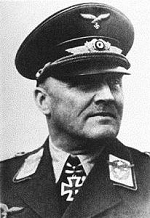Head of the Heer
Photograph
Name
Period of Service
Notes

Werner von Fritsch
1930s to September 1941
Was target of a blackmail attempt by Hitler's fringe party over his wife's activities, but the entire affair was quickly put to a stop by Göring. An excellent administrator, is credited widely as being the reason for the German Army's readiness in 1941. After being replaced by von Kressenstein in September 1941, he was given command of an Army Group.

Kress von Kressenstein
September 1941 to June 1943. (Medical Reasons)
Recalled to frontline service and placed in command of the German Army following the Rape of Rome due to his extensive experience with fighting the Draka as an aide to the Ottoman Forces in World War I.
Was forced to leave office in the summer of 1943 due to "medical reasons".

Paul von Lettow-Vorbeck
June 1943 to September 1947.
Served as the Military Governor of German Africa post-war. He was essentially forced to retire from his post as Reichsheer head in 1947, due to basically office politics; the Draka by 1947, were recognized as being finished; the only thing in contention being when they would finally die, and many ambitious younger generals wanted the top job.

Erich von Manstein
September 1947 to June 1950
Got the job through political manuvering.









